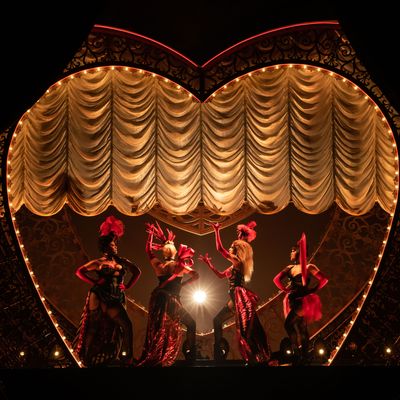
The list of theater superstitions is a long one: Don’t say “Good luck” before a show. For goodness’ sake, don’t say “Macbeth” inside a theater. Never bring a peacock feather onstage. When you’re backstage, don’t whistle. Mirrors onstage are bad luck. So are three lit candles and the color blue.
Maybe having an elephant in the room needs to be added to the list. In Moulin Rouge! — the latest Global Creatures megamusical to drop its payload of Hollywood-inspired excess all over Broadway — a bulky (if mini) model of the movie’s memorable pachyderm is crammed into one of the Al Hirschfeld’s balconies. And the big blue (!) beastie seems to have brought along a buddy, more metaphorical but no less obtrusive: For all its splashy, glittery, high-kicking, butt-cheek-baring, sword-swallowing maximalism, Moulin Rouge! is something more unsettling than not good. It’s not even very interesting. There’s a shapelessness about it, a weird enervation underneath the flash and bang. It’s directed by Alex Timbers, but it feels like it was assembled by committee, even by algorithm. The show veers broadly away from its beloved-by-millennials-everywhere source material, which in itself is no crime. But the path its creators have taken is one long trip through the Kingdom of Pandering, with multiple pit stops in the Meadows of Cutesiness and the Forest of Flat Characters. Everywhere it should be filthy, it’s scrubbed aggressively clean, yet somehow it’s still a hot mess.
Perhaps this might have tipped us off. When my colleague Jackson McHenry spoke to Timbers and to the film’s director and co-writer, the Australian auteur Baz Luhrmann, Timbers revealed that “the show has something like 78 licensed songs.” Apparently, he “holed up in a hotel room” with music supervisor Justine Levine — who also orchestrated and arranged the show’s pop-stravaganza of a soundtrack — and “went through every story moment” to figure out what new, trendy hook they could attach to it. Luhrmann’s La Bohème–meets–Bollywood film of the fin de siècle love affair between a tubercular courtesan and a wide-eyed young writer was always a mashup musical, with its stars belting out singles by Elton John and Bowie and Sting. But now it’s become little more than a jukebox. As a Broadway show, its top priority isn’t character, narrative, or even nostalgic appeal for the movie’s adoring fans: Instead, it commits single-mindedly to stuffing in as many additional hit tracks as possible. You will hear Beyoncé, Sia, Rihanna, Adele, Gnarls Barkley, Lorde, fun., Katy Perry, Lady Gaga, Britney Spears, Talking Heads, the Eurythmics, Regina Spektor, and the goddamn Postal Service. Whether you’ll really enjoy any of it is an open question. Moulin Rouge! is a singularly unsatisfying smorgasbord, all amuse-bouches and no real main courses. Watching it feels like channel surfing or browsing Facebook at 3 a.m. — lots of tiny little dopamine surges with no real payoff. And as Parisian prostitutes should be well aware, it doesn’t take long for the tease to get tiring.
Timbers, Levine, and the musical’s producers might think this kind of musical excess is right on brand, that they’ve triumphantly out-Luhrmanned Luhrmann. But they’ve taken the kitschiest aspect of the film and driven into it full force, in the process obscuring the characters and eccentricities that made Moulin Rouge! — if brazenly over-the-top — brazenly appealing, too. Don’t hold your breath for the Tango de “Roxanne,” or for “Spectacular Spectacular,” or even for “Elephant Love Medley.” They’re there, but they’re buried in an avalanche of flimsy filler. Timbers doesn’t even seem excited about them. His approach to most of the movie’s big numbers is perfunctory, as if he’s going through the motions with them so that he can get around to what he really wants to do: Stage a big showstopper to “Bad Romance” or put a bunch of dramatic moving lights on Aaron Tveit (who plays the young writer, Christian) while he belts out “Rolling in the Deep.” It’s two and a half hours of karaoke on a multimillion-dollar budget.
And its actors seem uncomfortably trapped by it. Take Sahr Ngaujah, who’s doing his damndest to bring some vitality and integrity to the ringleader of the Bohemians, the artist Toulouse-Lautrec; or the Broadway veteran Danny Burstein, who’s trying to put his dependable charisma to work as the unctuous but endearing entrepreneur, Harold Zidler. Both men give the impression that they’re struggling against the material, rather than working with it, to create a character. John Logan’s big-lick-and-easy-joke-filled book doesn’t give them much to build on, and every time they get close to landing a moment, Timbers swipes it out from under them by having them launch into yet another pop song. The same little titter of recognition happens in the audience every time — “Omg that one, too? Lolz!” — but the actors still have to muscle through the songs themselves, which often feel generic, connected to emotional state rather than to action. Why have Satine (Karen Olivo) belt Katy Perry’s “Firework” instead of singing Randy Crawford’s pensive hit, “”One Day I’ll Fly Away”? Why give Burstein Sia’s “Chandelier” and strip him of the wacky, role-playing weirdness of the movie’s take on “Like a Virgin”? The answer is obvious — bigger, newer, louder, flashier! — but the results are flattening. “One Day I’ll Fly Away” actually taught us something about Satine in Luhrmann’s film: She dreams of escaping her life at the Moulin Rouge to become “a real actress.” And “Like A Virgin,” for all its grotesque silliness, gave Zidler a task: Distract the evil Duke who wants to devour Satine — divert him from sex with her for as long as possible.
Olivo and Burstein get no such solid, if heightened, objectives to work with. Instead, they get states of being: tragic but resolute (“Firework”) and numb with debauchery (“Chandelier”). And meanwhile, the evil Duke (Tam Mutu) gets exactly what he wants. In Timbers’s Moulin Rouge!, Satine doesn’t maneuver her way out of sex with him; she simply becomes his mistress because (we are reminded frequently) that’s what she has to do to survive. Such a tweak might seem natural enough, but it desperately deflates the story’s stakes. The Duke isn’t waiting for anything; he’s already got what he came for. Timbers and Logan have reimagined the Duke, in the person of Mutu, as confident, powerful, and straight-up sexy — hardly different in age and type from Tveit’s Christian (he just … has a beard and wears a lot of black). But part of the effectiveness of the original character was his freaky, mustache-twitching awkwardness, the cringey, sweaty, ill-concealed lust, and the sense that something feral was about to leap out of Richard Roxburgh’s pants. Again, the musical has slicked over the potential for gross, gritty, real feeling amidst the artifice. It never finds a way to give us the sensation that Luhrmann’s camera does, when it zooms straight into the faces of his actors, distorting them into grotesques and letting us see their pores, their veins, their teeth. It is, on the whole, startlingly devoid of actual passion. There’s more emotion — and more nasty, wacky fun being had — in this GIF than in the entire show.
All this baggy pseudo-cleverness on the part of its creators makes Moulin Rouge! into that most gut-wrenching of spectacles: the Broadway blowout that’s all dressed up with nowhere to go. The show is practically ripping at the seams with eye-popping design and with onstage talent, particularly among its ensemble of dancers, who tear through Sonya Tayeh’s nonstop, multi-genre, appropriately extravagant choreography like a bunch of bedazzled gazelles on leg day. The muscular Robyn Hurder is physically riveting as Nini, Satine’s bitchy but loyal understudy who gets to throw down with Santiago (Ricky Rojas) in the show’s climactic tango of jealousy, and all her Moulin Rouge soul sisters (including Jeigh Madjus as Baby Doll and, on the night I saw the show, Bahiyah Hibah standing in for Jacqueline B. Arnold as La Chocolat) join her in kicking up a storm.
But in service of what? At the center of the show, Tveit and Olivo, for all their individual talent, don’t spark much real chemistry, and each one seems a little stranded. Tveit’s Christian, who’s now a cornfed Ohio boy, has no rough edges, and Olivo is given too many old tropes to play to make anything specific out of Satine. Tellingly, the musical makes a half-hearted attempt to reposition her as the hero — “This is a story about a woman named Satine,” Christian tells us — but we still end up with four men onstage, mourning her and talking about how she showed them “all that truly matters in life.” That’s fine, that’s the story — spare me the surface-level 2019 rebranding.
The real frustration of Moulin Rouge! is that it feels so completely like a product. Underneath its pulsing, crimson exterior, it’s creepily cold-blooded. Glib and fancy, sanded down and packed full of pop, it never moves us — it hardly even titillates. The Bohemian ideals its characters keep trumpeting (truth, beauty, freedom, love) might as well come with a ™ attached. For $40, you can buy them in the lobby on a T-shirt. Right after you’ve listened to the cast follow up a romantic tragedy by bopping around to “Hey Ya!” during the curtain call. In the immortal words of Outkast, “Why, oh, why, oh, why, oh, why, oh, why?”
Moulin Rouge! is at the Al Hirschfeld Theatre.





